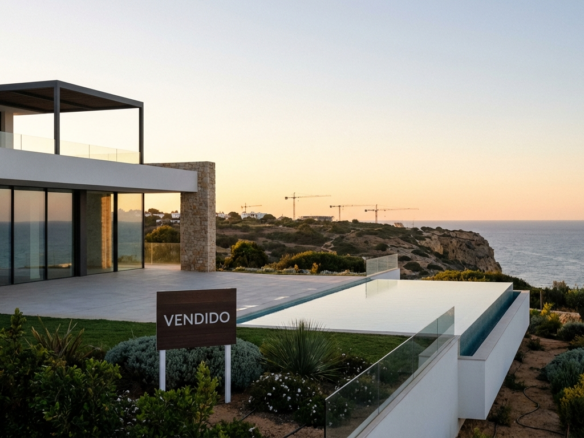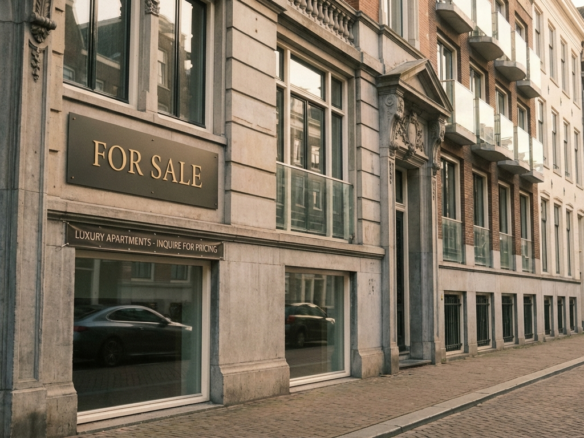Portugal has implemented significant changes to its immigration and investment policies in 2025, marking a decisive shift in how the country approaches foreign investment and citizenship pathways. These new regulations represent the most substantial overhaul of Portugal’s Golden Visa program since its inception, directly impacting thousands of prospective investors and immigrants worldwide.
Get 50% OFF!
Subscribe to our newsletter and enjoy a 50% discount on all listing packages, no strings attached!

The policy changes come as Portugal grapples with a severe housing affordability crisis that has priced out many local residents from major urban centers. With property prices in Lisbon and Porto rising by over 40% in the past three years, the government has taken bold steps to prioritize housing availability for Portuguese citizens while maintaining selective foreign investment channels.
Portugal Raises Property Investment to €500,000
The Portuguese government has officially increased the minimum property investment threshold from €350,000 to €500,000 for foreign investors seeking residency through real estate purchases. This represents a 43% increase in the required investment amount, making Portugal’s Golden Visa program significantly more expensive for international buyers. The new threshold applies to all property purchases made after January 1, 2025, with no grandfathering provisions for pending applications.
This substantial increase positions Portugal among the higher-tier investment immigration programs in Europe, comparable to Spain’s €500,000 requirement but still below countries like Cyprus and Malta. The government estimates that this change will reduce the number of Golden Visa applications by approximately 30-35% annually, while ensuring that approved investments contribute more substantially to the national economy. Properties in designated low-density areas may qualify for a reduced threshold of €400,000, but these regions are limited to specific municipalities outside major metropolitan areas.
New Rules Target Foreign Real Estate Investors
The revised regulations introduce strict limitations on where foreign investors can purchase property using Golden Visa pathways. Investment properties are now prohibited in Lisbon, Porto, and coastal areas of the Algarve, forcing investors to focus on interior regions and smaller cities. This geographic restriction aims to redirect foreign capital away from overheated markets where local residents face the greatest housing affordability challenges.
Additionally, the new rules mandate that at least 60% of Golden Visa real estate investments must be directed toward renovation projects of properties older than 30 years or new developments that include affordable housing components. Foreign investors must also demonstrate that their property purchases will create a minimum of two full-time jobs for Portuguese residents within 24 months of acquisition. These requirements represent a fundamental shift from passive investment toward active economic contribution, aligning foreign investment with national housing and employment priorities.
Citizenship Wait Time Extended to 7 Years
Portugal has extended the minimum residency requirement for naturalization from five years to seven years for all new applicants, including those entering through Golden Visa programs. This change affects all residence permit holders who apply for citizenship after March 2025, creating a longer pathway to Portuguese and European Union citizenship. The extension brings Portugal more in line with other EU countries like Germany and France, which typically require seven to eight years of residency before naturalization.
The government justifies this extension as necessary to ensure proper integration and genuine connection to Portuguese society. New citizenship applicants must now demonstrate intermediate Portuguese language proficiency (B2 level) rather than the previous basic requirement, and complete 40 hours of civic education courses about Portuguese history, culture, and legal systems. Statistics show that approximately 12,000 people obtained Portuguese citizenship through investment routes in 2024, but officials project this number will drop to around 7,000-8,000 annually under the new seven-year requirement.
Golden Visa Program Faces Major Overhaul
The Golden Visa program now emphasizes non-real estate investment options, including a €1.5 million capital transfer option, €500,000 in Portuguese investment funds, or €350,000 in research and development activities. These alternatives aim to diversify foreign investment beyond real estate while supporting innovation and business development. The program also introduces annual review requirements, where visa holders must demonstrate continued investment and spending at least 14 days per year in Portugal.
New compliance measures include mandatory reporting of all Portuguese income and assets to tax authorities, regardless of the investor’s tax residency status. The government has also established investment monitoring committees that will conduct annual audits of Golden Visa projects to ensure promised job creation and economic benefits materialize. Failure to meet ongoing obligations can result in visa revocation, even for investors who have held permits for multiple years. These changes reflect Portugal’s commitment to ensuring that Golden Visa investments generate tangible benefits for the domestic economy rather than serving primarily as citizenship pathways.
Housing Crisis Drives Policy Changes in 2025
Portugal’s housing affordability crisis has reached critical levels, with average property prices in Lisbon increasing by 180% since 2015 and rental costs rising by 95% in the same period. The median home price in central Lisbon now exceeds €6,000 per square meter, making homeownership impossible for most Portuguese families earning median incomes of approximately €14,000 annually. These statistics have created significant political pressure for policy interventions that prioritize local housing needs over foreign investment attraction.
The government’s new policies are part of a comprehensive housing strategy that includes rent control measures, increased social housing construction, and tax incentives for Portuguese first-time homebuyers. Officials estimate that limiting Golden Visa real estate investments in major cities will free up approximately 2,000-2,500 residential units annually for domestic buyers. While these measures may reduce foreign investment inflows by an estimated €800 million to €1 billion annually, policymakers argue that housing affordability for Portuguese citizens takes precedence over investment immigration revenues.
These sweeping changes to Portugal’s investment and citizenship policies reflect a broader European trend toward balancing foreign investment benefits with domestic housing needs and social cohesion. While the new requirements will undoubtedly reduce the attractiveness of Portuguese Golden Visa programs for some international investors, they may ultimately create a more sustainable and politically viable immigration system.
Prospective investors should carefully evaluate these new requirements against their investment goals and timeline expectations, as the landscape for Portuguese residency through investment has fundamentally shifted in 2025. The success of these policy changes will likely influence similar reforms across other EU countries facing comparable housing affordability challenges.





Join The Discussion